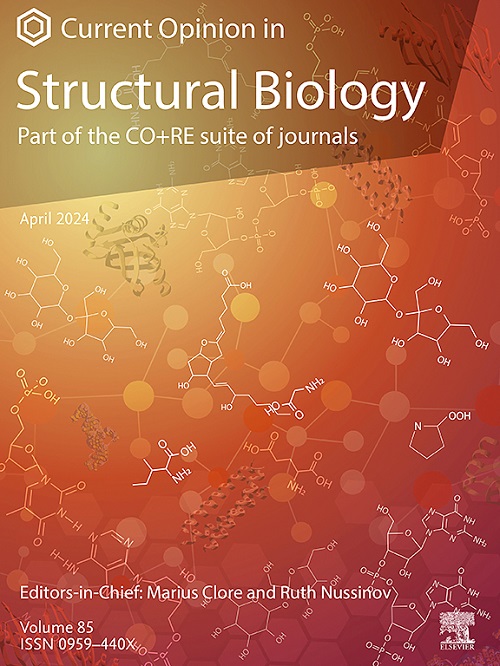无序产生功能:内在无序脂质化膜锚对小 GTPase 功能的调控。
IF 6.1
2区 生物学
Q1 BIOCHEMISTRY & MOLECULAR BIOLOGY
引用次数: 0
摘要
小 GTP 酶的固有无序脂质修饰膜锚正在成为一种重要的功能调节器,它能够以构象依赖的方式对脂质进行分类。我们回顾了最近的计算和实验研究,这些研究已开始揭示这类独特的脂质固有无序区(LIDRs)的序列-构象-功能关系。本文章由计算机程序翻译,如有差异,请以英文原文为准。
From disorder comes function: Regulation of small GTPase function by intrinsically disordered lipidated membrane anchor
The intrinsically disordered, lipid-modified membrane anchor of small GTPases is emerging as a critical modulator of function through its ability to sort lipids in a conformation-dependent manner. We reviewed recent computational and experimental studies that have begun to shed light on the sequence-ensemble-function relationship in this unique class of lipidated intrinsically disordered regions (LIDRs).
求助全文
通过发布文献求助,成功后即可免费获取论文全文。
去求助
来源期刊

Current opinion in structural biology
生物-生化与分子生物学
CiteScore
12.20
自引率
2.90%
发文量
179
审稿时长
6-12 weeks
期刊介绍:
Current Opinion in Structural Biology (COSB) aims to stimulate scientifically grounded, interdisciplinary, multi-scale debate and exchange of ideas. It contains polished, concise and timely reviews and opinions, with particular emphasis on those articles published in the past two years. In addition to describing recent trends, the authors are encouraged to give their subjective opinion of the topics discussed.
In COSB, we help the reader by providing in a systematic manner:
1. The views of experts on current advances in their field in a clear and readable form.
2. Evaluations of the most interesting papers, annotated by experts, from the great wealth of original publications.
[...]
The subject of Structural Biology is divided into twelve themed sections, each of which is reviewed once a year. Each issue contains two sections, and the amount of space devoted to each section is related to its importance.
-Folding and Binding-
Nucleic acids and their protein complexes-
Macromolecular Machines-
Theory and Simulation-
Sequences and Topology-
New constructs and expression of proteins-
Membranes-
Engineering and Design-
Carbohydrate-protein interactions and glycosylation-
Biophysical and molecular biological methods-
Multi-protein assemblies in signalling-
Catalysis and Regulation
 求助内容:
求助内容: 应助结果提醒方式:
应助结果提醒方式:


